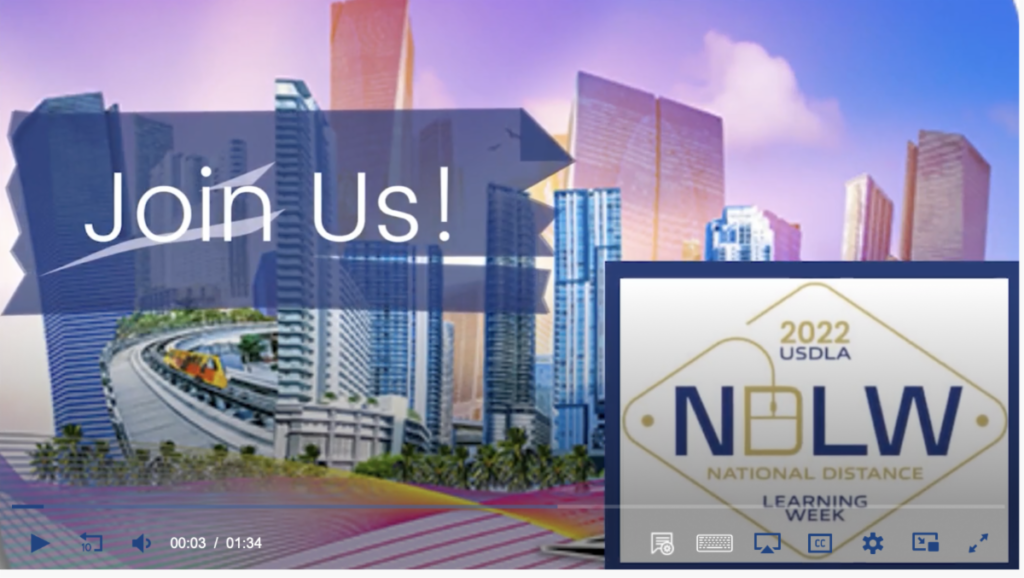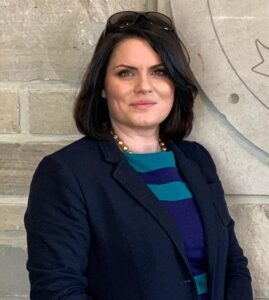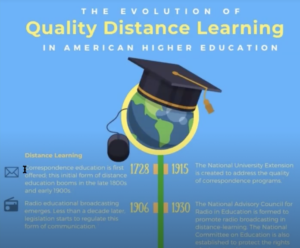
National Distance Learning Week (NDLW) 2022: The Recap
If you missed NDLW this month or want to re-watch the sessions, this is your chance!
Hello friends! We hope you had a wonderful Thanksgiving, and we want to start this week by offering your first gift of the holiday season — a recap of the 8 sessions of NDLW 2022.
Click here to go directly to watch all of the videos, and scroll down for details on the sessions you want to hear again or may have missed. To get started, click here to watch Day 1 Session #1.
Please note: As a USDLA member, you will have access to the sessions for the duration of your membership, while non-members will have access until the end of December. We invite everyone thinking about joining USDLA to celebrate themselves and become one of the thousands of members of our international organization. Click here for membership information: usdla.org/membership
From myself and the USDLA Board of Directors, we wish you and yours a happy, safe, and healthy holiday season! — Pat, pcassella@usdla.org
 Click here to watch Day 1: Session #2
Click here to watch Day 1: Session #2
Avoiding Common Errors in Leading Online Programs
Presented by: Dr. Anthony Pina, Chief Online Learning Officer at Illinois State University
Although online education continues to rise in importance at higher education institutions, many initiatives need to be improved by common errors made by leaders with little orientation or experience in institution-wide distance education, instructional design, or educational technology. Join us as we navigate some common errors in leading online programs and how to avoid them.
 Click here to watch Day 2: Session #1
Click here to watch Day 2: Session #1
Project Management, Change Management, and Now F’ing Management: Strategies for Managing Teams Managing Innovations in Higher Education
Presented by: Gerry Hanley, Executive Director, MERLOT & Chief Academic Office, Partner in Publishing
Strategies for managing academic technology teams in higher education can make or break a campus initiative. The F’ing Management strategy covers the principles of Family First, Friendship, Forgiveness, Fun, Fairness, Facilitation, and Flexibility. The sessions will discuss the application of these principles and why they work in higher education.
 Click here to watch Day 2: Session #2
Click here to watch Day 2: Session #2
Empowering Leaders of Online Education
Presented by: Dr. Georgianna Laws and Dr. Travis Neal
The quality of an online education program relies on the empowerment of its educational leadership, but how can that be measured and enacted? Join this session to examine how to empower online leaders to administer high-quality online programs. More specifically, using French and Raven’s Bases of Power and Hofstede’s Power Distance, this presentation will go over how power distribution affects organizational traits such as standardization, innovation, communication, and risk-taking. With this information, you’ll be able to accurately calibrate the types of power and the ideal power distance suitable for the online leader operating your unique organizational culture. The session will engage you in group discussion and will provide you with the first-ever look at a power difference measurement tool you can share with your colleagues.
Click here to watch Day 3: Session #1
Stewardship and the Future of Instructional Delivery
Presented by: Dr. Alexandra Salas, Dean, Division of Innovation, Teaching, Digital Learning Excellence & Education Support Services, Delaware County Community College
This presentation shares challenges, lessons learned, and possibilities for higher education curated during the summer and fall of 2021 and spring of 2022 from research and one-on-one conversations with 22 college presidents and other higher education professionals, who shared insights on the curiosities driving this book. Leaders discuss higher ed ecosystems and strategies and tools to support this dynamic interconnect system. K-12 and higher ed.
 Click here to watch Day 3: Session #2
Click here to watch Day 3: Session #2
The Chief Online Learning Officer in a Post-Pandemic World
Presented by: Dr. Melanie Shaw, Professor, National University
The Chief Online Learning Officer is a key role in higher education. With the disruption in educational praxis caused by the unintentional shift to online learning required for most institutions during the pandemic, this role is more critical than ever.
In this presentation, we will explore the key skills needed to advance leadership in the online space and undo some of the harms caused by poorly implemented and actualized online learning over the past few years. Participants will emerge with strategies to apply in their own online contexts to promote success for distance education stakeholders.
 Click here to watch Day 4: Session #1
Click here to watch Day 4: Session #1
SARA Resources: Helping Colleges and Universities with Distance Education Reciprocity
Presented by: Melanie Booth and Emily Jacobson
This session will share with participants the large variety of resources for SARA-participating institutions to support their SARA-related needs, including the institution cost-savings calculator, interactive data dashboards, SARA Source online catalog, online courses, and other resources for institutional personnel. Participants will also learn about the benefits of SARA participation and the requirements and tips for success.
Click here to watch Day 4: Session #2
 Getting to Know USDLA
Getting to Know USDLA
Presented by: USDLA Board of Directors
What do USDLA members have in common? The desire to provide extraordinary distance learning education to students around the world. In this presentation, you’ll learn more about USDLA from longtime members who are excited to bring you into the group!
Be sure to watch this session, and click here to learn more about becoming a member: usdla.org/membership
 Click here to watch Day 5: Session and Closing Remarks
Click here to watch Day 5: Session and Closing Remarks
Pure Heart Leadership™
Presented by: Dr. Shana Garrett, LPC, NCC, Dean for the College of Psychology and Community Services, Walden University
Pure Heart Leadership™ is an approach that encourages an authentic style while recognizing the individuality and strengths of leaders. This leadership model was developed based on over 20 years of professional experience within higher education while blending several key psychology theories of Albert Bandura, Abraham Maslow, and Carl Rogers with a mindfulness approach to working with others.
This model is one of encouragement, empowerment, and truly rewarding in self and team Development. Our leadership style encompasses who we are—our strengths, weaknesses, and values—all applied behaviorally to how one leads others. Awareness of one’s leadership style gives a better working knowledge of how one operates, intermingles with folks, and communication style.
The greater understanding one has about who they are and how one presents, the more empowerment experienced to solidify strengths, build development opportunities, and relate with others. Discovering your leadership style includes three key components: self-evaluation for baseline, observations from others, and comparing your style against the organizational culture. This research provides a pathway to exploring individual leadership qualities, assessment in your current state of approach, and how to identify and collaborate with your organizational team members’ styles.
 Coming soon: Two postponed NDLW sessions will become webinars in the coming weeks. Stay tuned for more!
Coming soon: Two postponed NDLW sessions will become webinars in the coming weeks. Stay tuned for more!
1. Leadership Perspectives of Rural Distance Learning
Presented by Dr. Matt Newlin
The COVID-19 pandemic revealed the countless ways rural and remote students are disadvantaged in higher education, particularly regarding distance learning. While institutions were quickly pivoting to online learning during the pandemic, little thought was put into whether or not some students would even have reliable broadband access once the campuses were closed.
As we come out of the pandemic, very few substantive changes have been made to account for students and communities whose access to online or distance learning is restricted by geography or technological limitations. Students are still struggling with access to distance learning, creating inequitable opportunities and outcomes for rural populations.
In this session, participants will learn about the most critical issues for institutions providing distance learning to students who live in rural or remote communities. Discussions will be based on present research and examples of practical changes already being implemented by institutions and organizations. Attendees will have the chance to critique their approach to serving rural and remote students and learn from other colleagues how they address their rural populations’ needs.
 2. Leadership decisions in faculty training for online teaching and learning
2. Leadership decisions in faculty training for online teaching and learning
Presented by Lisa A. Clark, EdD, Senior Product Manager, Learn Ultra
Distance education has evolved into a trusted, necessary, and expected form of delivering higher education content, no longer considered a fad or a new method of instruction. Due to the rapid growth of distance education offerings, early participating faculty needed more training, guidance, or standards regarding building their virtual courses.
Fast forward to 2020 and the shutdown of in-person instruction worldwide, most Instructors needed more time to be ready to address the differences between synchronous (traditional face-to-face) and asynchronous (via distance education) learning environments.
Now, more than ever, students expect online education offerings at their institutions and may obtain their entire degree program via distance. What is the best way to encourage training for online teaching? What is truly important to instructors regarding their preference for training and incentives for training? These topics and more will be shared in this session to outline ideas related to leadership decisions for online teaching and learning training.
